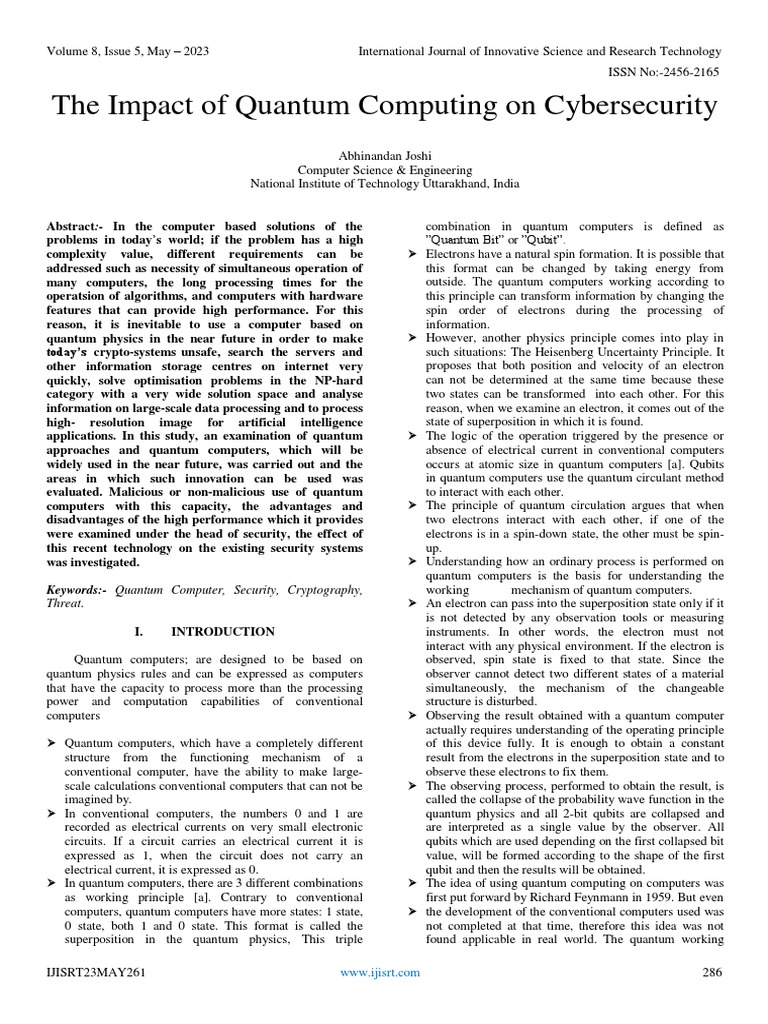As we traverse the transformative landscape of technology, a tantalizing question emerges: How will quantum computing affect personal computing? The realms of classical and quantum systems are set to diverge significantly, promising enhancements that could redefine our interaction with technology. In considering this question, we not only delve into theoretical frameworks but also contemplate practical implications that may soon permeate everyday life.
Quantum computing, in its essence, leverages the principles of quantum mechanics—superposition, entanglement, and interference—to perform calculations at unprecedented speeds. Consequently, what distinguishes quantum computing from classical computing is the qubit, the fundamental unit of quantum information that exists in multiple states simultaneously, unlike the binary bit confined to 0 or 1. This foundational difference opens a Pandora’s box of possibilities, particularly in personal computing environments.
First, we must ponder the enhancements to computational speed and efficiency. Imagine a scenario wherein mundane computational tasks, such as data encryption and algorithmic problem-solving, could be executed almost instantaneously. For individuals and small businesses alike, this capability could streamline operations, allowing for seamless multitasking and enhanced productivity. However, with great power comes formidable challenges—how will existing software architectures adapt to leverage this newfound computational prowess?
The integration of quantum computing into personal and professional contexts necessitates a seismic shift in software development methodologies. Traditional programming languages may no longer suffice in expressing the intricacies of quantum algorithms. As a result, quantum programming languages, such as Q# or Qiskit, will become essential tools for developers, fostering a new breed of coders who are fluent in the arcane dialects of qubit manipulation. The transition may initially prove daunting, as the learning curve steepens. This creates a dichotomy: an era ripe with potential versus the challenge of a skills gap in the workforce. Will educational institutions adapt swiftly enough to prepare future generations for this quantum leap?
Furthermore, the promise of quantum computing extends beyond mere speed; it impinges upon cryptography as we know it. The security protocols that safeguard personal data today, primarily based on classical mathematical assumptions, face existential threats from quantum algorithms like Shor’s algorithm. This algorithm can factor large integers exponentially faster than classical counterparts, thereby potentially rendering contemporary encryption methods obsolete. As such, the query emerges: how will personal computing environments respond to the impending obsolescence of current security protocols?
The solution may lie in the burgeoning field of post-quantum cryptography, which seeks to develop encryption systems resilient to quantum attacks. Consumers and organizations alike will need to be proactive in adopting these advanced security measures to safeguard sensitive information. Yet, as sophisticated as these solutions may be, the inherent complexity could introduce new vulnerabilities. An essential challenge persists: can post-quantum cryptographic systems be made accessible for the average consumer, thereby democratizing security in an increasingly digital world?
Another facet of quantum computing’s impact on personal computing is the transformation of artificial intelligence (AI) capabilities. Quantum machine learning holds the potential to revolutionize how personal computing handles data. Traditional machine learning algorithms, which can require copious amounts of time and processing power, may be exponentially accelerated through quantum computation. For instance, tasks involving pattern recognition, data classification, and predictive analytics could become significantly more efficient, ushering in personalized computing experiences that adapt more intuitively to individual user needs. Yet, this leads to an intriguing predicament: how will data privacy concerns evolve when AI systems become ubiquitous, informed by increasingly data-rich environments?
The ramifications of enhanced AI do not solely apply to user experience; they echo into ethical considerations. As personal computing platforms integrate quantum-enhanced AI, questions surrounding algorithmic bias, data usage, and user autonomy surface. Navigating these moral quandaries will require cross-disciplinary collaboration, uniting technologists, ethicists, and policymakers in pursuit of a balance between innovation and responsibility.
Additionally, the physical landscape of personal computing may witness seismic changes as quantum technologies mature. Current computers, limited by thermal noise and power consumption, may give way to quantum processors that require novel cooling techniques and entirely new architectural designs. Devices steeped in qubit technology may become commonplace, shifting the paradigms of hardware development and consumer commercialization. However, as quantum hardware wrestles with scalability and integration challenges, a crucial question arises: how sustainable will these innovations be in the context of resource consumption and environmental impact?
As quantum computing edged closer to the mainstream, the specter of a digital divide looms larger than ever. The prospect of this advanced technology being confined to elite organizations or affluent consumers exacerbates socioeconomic disparities. Policymakers and industry stakeholders must collaborate to ensure equitable access to quantum computing resources, lest we inadvertently entrench existing divides within society.
In conclusion, the effects of quantum computing on personal computing promise to be as multifaceted as they are profound. As we stand on the precipice of this new frontier, the interplay between enhancement and challenge becomes increasingly apparent. From the evolution of programming languages and cryptographic practices to the ethical ramifications wrought by hyper-intelligent AI systems, a holistic and interdisciplinary approach will be essential. As we venture onward, one question remains paramount: will humanity rise to meet the challenges posed by quantum computing, or shall we languish in our creations’ wake? The answer lies not only in technological advancements but in our collective resolve to navigate this uncharted territory with wisdom and foresight.












